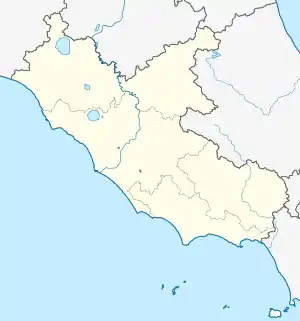Campodimele | |
|---|---|
| Comune di Campodimele | |
 | |
 Coat of arms | |
Location of Campodimele | |
 Campodimele Location of Campodimele in Italy  Campodimele Campodimele (Lazio) | |
| Coordinates: 41°23′N 13°32′E / 41.383°N 13.533°E | |
| Country | Italy |
| Region | Lazio |
| Province | Latina (LT) |
| Government | |
| • Mayor | Roberto Zannella |
| Area | |
| • Total | 38.38 km2 (14.82 sq mi) |
| Elevation | 647 m (2,123 ft) |
| Population (31 March 2017)[2] | |
| • Total | 604 |
| • Density | 16/km2 (41/sq mi) |
| Demonym | Campomelani |
| Time zone | UTC+1 (CET) |
| • Summer (DST) | UTC+2 (CEST) |
| Postal code | 04020 |
| Dialing code | 0771 |
| Patron saint | St Onuphrius |
| Saint day | 12 June |
| Website | Official website |
Campodimele is a town and comune in the province of Latina, in the Lazio region of central Italy. It is located on a steep Karstic hill, between the Monti Ausoni and Monti Aurunci ranges.
The economy is mostly based on agriculture.
History
Campus Mellis rose probably over the roof Apiola, a very ancient Latin city, destroyed by Tarquinius Priscus, fifth king of Rome (579 BC); the ruins of Apiola are visible 6 kilometres (4 mi) away from the present-day historic center of Campodimele. In the 6th century AD, the Lombards established the first fortified settlement, while in the following century it was part of the possessions of the Monastery of Montecassino.
From 916, it was acquired by the Duchy of Gaeta. Campo de Melle is mentioned again in a donation by the Consul of Fondi in 1072. In 1087, Pope Victor III had a list of the abbey's property sculpted onto the bronze door of the Basilica of Montecassino. In 1384, it became a possession of the Caetani family of Fondi, but, in 1497, King Frederick IV of Naples gave the county of Fondi with the surrounding duchies, including Campodimele, to the Colonna family.
In 1534, Giulia Gonzaga fled here from the Algerian pirate Hayreddin Barbarossa. In 1591, the fief was inherited by Luigi Carafa, Prince of Stigliano. Campodimele gained municipal rights in 1813.
During World War II, the Gustav Line passed through Campodimele. Alberto Moravia, who had been deported here, took inspiration from the happenings of the time for his novel La Ciociara.
Main sights
- The walls (11th century AD).
- Monastery of Sant'Onofrio, founded by Desiderius of Montecassino in the 11th century.
- Parish church of San Michele Arcangelo, built in the 11th century over a pre-existing pagan temple.
- Church of Annunziata (13th century)
Transportation
Campodimele can be reached through the Liri Valley State Road 82.
Longevity of residents
Campodimele is known for the longevity of its residents, with the town's population now expected to live to an average age of 95.[3][4]
References
- ↑ "Superficie di Comuni Province e Regioni italiane al 9 ottobre 2011". Italian National Institute of Statistics. Retrieved 16 March 2019.
- ↑ "Popolazione Residente al 1° Gennaio 2018". Italian National Institute of Statistics. Retrieved 16 March 2019.
- ↑ Longevity Way of Life in Italy Mountain Hamlet : Research: Focus varies from lifestyle to blood pressure to genetic traits. The locale seems a near-ideal union of the classic Mediterranean diet and healthy bucolic living. Los Angeles Times, USA. Published February 05, 1995. Accessed 10 July 2011.
- ↑ The secrets to a long life. Daily Telegraph, UK. Published 10 July 2011. Accessed 10 July 2011.
Further reading
- Lawson, Tracey (2011). A Year in the Village of Eternity: the Lifestyle of Longevity in Campodimele, Italy. Bloomsbury. ISBN 1-59691-502-1.
External links
- Official website (in Italian)